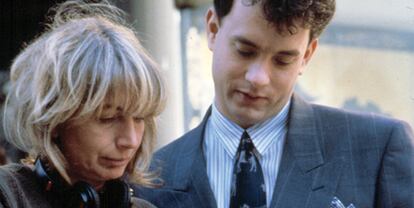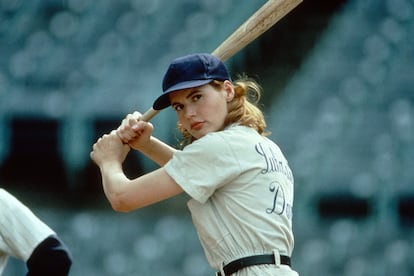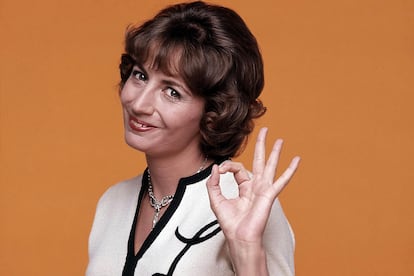Penny Marshall, the hugely successful director ignored by Hollywood
The pioneering filmmaker conquered the box office and paved the way for later hits like ‘Barbie,’ yet she abandoned show business for decades

During an interview in 1986, novice film director Penny Marshall revealed why she had been so reluctant to get behind the camera. “I need an enormous amount of encouragement to do anything, even to go out to dinner.” The director was known for her aversion to publicizing her work or engaging in any self-promotion, unlike most other famous filmmakers. This aspect of her personality may have led to her being undervalued by the film industry, despite her exceptional talent as an actress and director. However, it has also enabled her work to endure over time, offering a more relatable perspective on the allure and magic of Hollywood. On the 35th anniversary of her classic film, Big, it’s time to celebrate the talent and contributions of this remarkable woman who was unjustly overlooked in her time.
Marshall died in 2018 due to health problems and isn’t around to see the box office records being shattered by Greta Gerwig’s Barbie. But Gerwig’s triumph is drawing renewed interest in the first female director who made commercially successful hits. People see parallels in the relational dynamics of the female baseball players in Marshall’s A League of Their Own and the women in Barbie. Or in the mannerisms of Tom Hanks’ character in Big and Ryan Gosling’s Ken. Marshall was the first woman to direct a film (Big) that grossed $100 million at the box office, and she did it again with A League of Their Own. In between, she became only the second woman to earn a Best Picture nomination for Awakenings.

Although her illustrious and pioneering career makes her an undisputed feminist icon in the world of cinema, Marshall never wanted to be labeled as such, and she was particularly irritated by critics referring to her films as “women’s movies.” A League of Their Own, about a women’s baseball league that entertained fans while most of the male professional players were off fighting in World War II, was unanimously praised for spotlighting how women have struggled to carve out space in a historically patriarchal world. However, Marshall felt the movie’s theme was universal and said, “It’s all about why we shouldn’t hide our talents. It’s a problem that affects men and women alike.”
Although she had directed several memorable and beloved comedies throughout her career, the filmmaker’s last film was released 17 years before she died. The box office disappointment of Riding in Cars with Boys in the aftermath of the 9/11 attacks marked the end of her directing career. The industry was wholeheartedly gravitating towards lucrative action franchises, leaving behind the mid-budget productions that had defined Marshall’s filmography. “I don’t do horror. I don’t do vampires. I don’t do car crashes and I don’t do people in big metal suits, and that’s what sells overseas... I tell stories,” she told Fox. Film critic Kevin Fallon refer to her as the clearest example of what Hollywood calls “movie jail” — professional marginalization after a film that performed poorly at the box office. In an industry as male-dominated as filmmaking, this tends to affect women more frequently than men. Directors like Mimi Leder (Deep Impact) and Kimberly Peirce (Boys Don’t Cry) have first-hand experience landing in movie jail. “When a woman makes a mistake, it tends to stick in people’s minds. But when a man makes a mistake, it’s often forgotten more easily,” said Peirce.

Marshall seemed to shrug off the double standard and focused on what she enjoyed — directing television episodes and indulging in her greatest passion, basketball. She was a fan of the Los Angeles Lakers and often sat courtside next to Jack Nicholson. When she died at the age of 75, she left an unfinished documentary about the controversial pro basketball player, Dennis Rodman. Fun, intelligent, relaxed and a total lack of pretension were the words friends used to describe her. She didn’t worry about leaving a legacy and described her directorial career as an “accident,” pointing to her debut on Jumpin’ Jack Flash, starring Whoopi Goldberg. “They called me — I didn’t knock on their door,” she said in a 2012 interview. Goldberg had specifically asked for Marshall to replace the original director, Howard Zieff, who had just been fired with filming underway.
Marshall, a native New Yorker, enrolled in the University of New Mexico but dropped out at 20 when she became pregnant with her daughter, Tracy. She married Tracy’s father, football player Michael Henry, but the marriage only lasted a few years. She later married actor/director Rob Reiner and moved to Los Angeles to be closer to her brother Garry, a screenwriter. Garry would go on to direct memorable films like Pretty Woman.

After appearing in several TV commercials, Marshall’s breakout role came in the 1970s sitcom Laverne & Shirley, which aired for eight seasons on the ABC broadcast network. The show revolved around the romantic misadventures of two roommates and co-workers in 1950s Wisconsin. The groundbreaking series not featured two female leads, but also defied the gender stereotypes of the time. Both were single women working in a beer factory at traditionally male jobs. “We’re gonna make it / Give us any chance we’ll take it / Read us any rule we’ll break it / We’re gonna make our dreams come true / Doing it our way,” were the opening lyrics of the show’s theme song.
Marshall became a star because of her comedic timing and distinctively nasal voice. She had romantic relationships with celebrities like Art Garfunkel and developed a lifelong friendship with Carrie Fisher. Marshall was eventually given the opportunity to direct episodes of Laverne & Shirley, but it took years before she answered Hollywood’s siren song. All she wanted was to make sure audiences had a great time. “I want you to laugh and cry,” she said. “That’s what I do.”

Sign up for our weekly newsletter to get more English-language news coverage from EL PAÍS USA Edition
Tu suscripción se está usando en otro dispositivo
¿Quieres añadir otro usuario a tu suscripción?
Si continúas leyendo en este dispositivo, no se podrá leer en el otro.
FlechaTu suscripción se está usando en otro dispositivo y solo puedes acceder a EL PAÍS desde un dispositivo a la vez.
Si quieres compartir tu cuenta, cambia tu suscripción a la modalidad Premium, así podrás añadir otro usuario. Cada uno accederá con su propia cuenta de email, lo que os permitirá personalizar vuestra experiencia en EL PAÍS.
¿Tienes una suscripción de empresa? Accede aquí para contratar más cuentas.
En el caso de no saber quién está usando tu cuenta, te recomendamos cambiar tu contraseña aquí.
Si decides continuar compartiendo tu cuenta, este mensaje se mostrará en tu dispositivo y en el de la otra persona que está usando tu cuenta de forma indefinida, afectando a tu experiencia de lectura. Puedes consultar aquí los términos y condiciones de la suscripción digital.









































